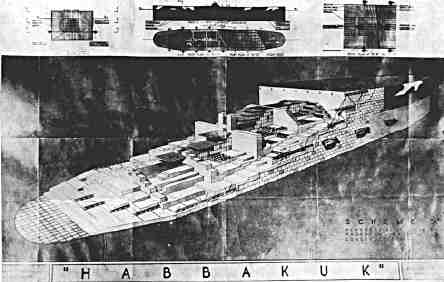Ice will win the war! Poor Geoffrey Pyke. No, he had money. And a mind, a tinkerer’s mind. And the ear of the rich & famous: Lord Mountbatten. His consternation over one of his oddball, serendipituous inventions was a wood fiber and water mixture, that, when frozen, refused to melt. His acquaintance, Lord Mountbatten, sold the idea to Churchill, who needed a way to station planes forms the United States to Britain to protect them fem the Germans.
The ice mixture was called pykrete, after its inventor, and he named the aircraft carriers he proposed to built from the stuff, “Habakkuk,” after Hab 1:5:
“Because I am doing something in your days— You would not believe if you were told.”
Sadly, unlike pykrete, the Habakkuk Project melted on the back burner of the practical. It was never built. But as astonished as Pyke was at the non-melting ice, the real Habakkuk was even more astonished that God would use a terrible, fierce, rogue nation to be His instrument of correction.
Habakkuk 1:2-4 – Why does God Permit Evil?
2 Peter 2 speaks also to this.
Consider the charges Habakkuk brings against his people (Judeans):
Violence – chamas H2555 Isn’t that interesting! Arabic word means zeal See Haaretz’s Word of the day for background. It is a homophone (sounds the same, like two and too). First use of this word is in Genesis 6:11-13:
Now the earth was corrupt in the sight of God, and the earth was filled with violence. God looked on the earth, and behold, it was corrupt; for all flesh had corrupted their way upon the earth. Then God said to Noah, “The end of all flesh has come before Me; for the earth is filled with violence because of them; and behold, I am about to destroy them with the earth.
So it would seem that God (and His sin-sensitive mouthpiece, Habakkuk) consider corruption the cause of violence. Could it be our prophet is looking for an ark to protect and purge?
Iniquity – Trouble, sorrow, wickedness
Wickedness – morally very bad, fierce evil.
Destruction & Violence – It is a simple thing to destroy. The coward needs little systematic effort nor organized planning to bring a work from a high state of organization, engineering, and focused effort to physical or moral rubble. To the builder belongs the praise, the destroyer destroys and then move on. There is no future withe the destroyer and his minions; they cannot build up a thing a people, or a society. All they can offer is the fleeting pleasure of its downfall, and the heartache that accompanies it. Pro 3:31-32
Strife & Contention – Jeremiah 15:10 shows how Jeremiah was a bringer of strife for the right reasons. Dividers take differences that ought not to matter, to manipulate the resulting contention for their own gain, usually political power. Jesus on the other hand, admonishes us to be peacemakers. (Sermon on the Mount, you go look it up. Hint: towards the start of Matthew’s Gospel.) Jude also had unflattering things to say about false prophets, who also caused divisions (Jude 19). Check your spiritual thermometer, are you a cause of strife? Do you divide? Murmuring against one leader or another?
Ignoring the Law – A law unto themselves. Coulsd be a benevolent ruler, or a tyrant. But it doesn’t matter, one who ignores the law is a lawmaker unto themselves, usurping the Law of God, and guilty of the supreme sin, pride:
“Do you indeed speak righteousness, O gods? Do you judge uprightly, O sons of men?” – Psalm 58:1
The “god” there is literally a mighty one. The meaning is one who judges. To a judge who judges rightly, well & good. Otherwise they ARE their own god.
Justice not Upheld – Slightly different, such as someone who has the deck stacked in his favor before he goes to court, often by bribery or influence, even extortion. Psalm 82:2 cries out:
“How long will you judge unjustly And show partiality to the wicked?”
Perverted Justice – Since the righteous are unable to administer justice, the is perversely applied.
Does any of this seem relevant?
Habakkuk 1:5-11 – God’s Answer
Jesus is on every page. The response God gave Habakkuk is quoted by Paul in Acts 13:41 to the synagogue at Pisidian Antioch as a warning to the Jews if they did not repent and turn to Jesus. They did not, and the prophecy of Jesus in the Olivet Discourse (Mat 25) was fulfilled, sadly.
This is yet another instance of a double prophecy, one that has a near and far fulfillment. Some other examples are Isa 7:14,
Num 21:9 with John 3, Joel 2:28-32 with Acts 2:16-21.
The Chaldeans are the progenitors of the Babylonians, of whom we spoke last week. God goes on to describe them to Habakkuk, and us. Note, they did not follow the norms of the day, they were a law unto themselves, certainly not of Yahweh. Jer 39:5-9 gives an insight of Baylonian justice with the capture of Zedekiah, which, as a side note, fulfilled in a strange way, the prophecy of Ezekiel 12:13
V10 tells how they mock and laugh. Isa 14:16 shows this, and the comeuppance they would eventually receive.
Habakkuk 1:12-17 – Are You Serious?
Isaiah 13 & 14, Jeremiah 50 % 51, and the as yet then, Revelation 17 & 18 deal with the punishment that God would pour out on Babylon. So the consternation Habakkuk shows is understandable.
Drag them away as in a net. Part of the problem is that the good will be judged with the bad.
We will not die is better understood as a question.
